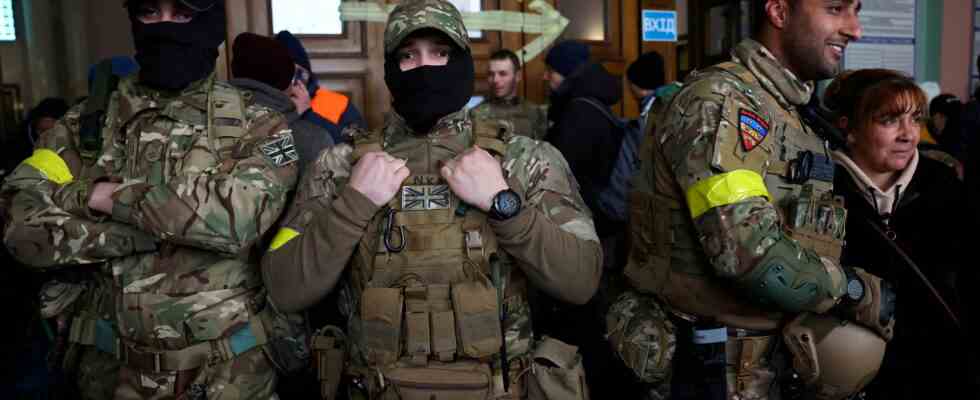Status: 03/11/2022 3:23 p.m
Thousands have gone to Ukraine to volunteer to fight against Russia. But the question is what they can achieve and what they are willing to accept.
It commemorates the Spanish Civil War in 1936, when volunteers from Europe and North America took part in the fight against the right-wing putschist General Franco: the call by Ukrainian President Volodymyr Zelenskyy to join the defense of Ukraine against “Russian war criminals”.
Foreign Minister Dmytro Kuleba wrote on Twitter that anyone who wants to take part in the “International Legion” can contact the Ukrainian diplomatic missions in the respective countries. At the weekend he spoke on the US broadcaster CNN of 20,000 foreign volunteers who have since responded to the call.
Inexperienced and elite soldiers
Many volunteers have arrived in the western Ukrainian city of Lviv in recent days. There is a recruitment office there. A government representative told the Reuters agency there that combat capability was being tested at a military base outside of the city. However, the structures for receiving, training and sending the volunteers are still in their infancy. For example, some foreigners travel to the combat zones on their own to join Ukrainian units there.
According to Kuleba, most come from Europe. There are also reports of volunteers from Japan and North America. The requirements for deployment in the war zone are as diverse as the motives: from completely inexperienced people without protective and combat equipment to veterans of elite units in the USA and Great Britain. In addition to equipment, they bring with them special knowledge in handling modern weapons, which they can pass on to the Ukrainian soldiers.
Military in Britain and France warn
States are dealing with this call for help from Kyiv in different ways. The Parliament of Latvia passed a law granting impunity to those involved in the war in Ukraine. Denmark also lets its citizens fight there. It is being debated in the Czech Republic and Austria.
Britain’s Foreign Secretary Liz Truss also showed support. It is the personal decision of everyone to join the armed resistance. However, the Commander-in-Chief of the British Forces, Admiral Tony Radakin, disagreed. In a BBC interview, he not only advised his compatriots against it. He also warned that if conscripted soldiers were fighting in Ukraine, Russia could interpret it as British troops joining the hostilities.
For this reason, a complicated situation also arises for the Foreign Legion in France. This association of foreign volunteers is part of the French army. Of the 9,000 soldiers, 710 are of Ukrainian origin and 450 are of Russian origin. They were now allowed to take their families to safety. But they are not allowed to take part in combat operations.
The commander of the Foreign Legion, Admiral Alain Lardet, admitted that there was unrest in the force because of the war. However, the Ministry of Defense emphasized that French soldiers may not engage in areas of operations in which France is not a party.
US President Joe Biden had made it clear even before the war began that there would be no rescue operations for US citizens in Ukraine, and all personnel, including observers, from the OSCE mission in eastern Ukraine were withdrawn.
communication barriers during use
Problems with the volunteers can also arise for Ukraine, especially if they lack military training. You must submit to the chain of command. Even if they have combat experience, a lack of language skills poses communication barriers.
In a text published by the Brookings Institution, US expert Daniel Byman refers to a study according to which foreign fighters are more likely than local soldiers to commit atrocities if they have no personal or family ties to the region. He also warns that right-wing militias could use the war to gain combat experience.
Mercenary forbidden
If the volunteers are paid like local soldiers, as the Ukrainian government says they are, they are legally mercenaries. According to a UN convention from 1989, mercenary work is forbidden, with participation in armed conflicts “for the sake of personal gain” being the main focus.
Accordingly, many states prohibit mercenary work and mercenary companies. But there are also differences to “private security companies”, such as the US company Blackwater of businessman Eric Prince and his successors, or the Russian Wagner Group, which is said to have been active in Ukraine since 2014. A lesser-known Russian security firm is the RSB group, made up of veterans of the Russian military intelligence agency GRU, which is also currently reported to be operating in Ukraine.
The government in Kyiv is offering fighters on the Ukrainian side a solution to legal problems in their home countries: they could take Ukrainian citizenship, reports the Kyiv Independent newspaper.
Russian death lists
Many Georgians have made use of this opportunity in recent years. The “Georgian National Legion” has been fighting alongside the Ukrainians in Donbass since 2014 and is a port of call for fighters from other countries. Other Georgians work for the government or the SBU secret service.
Both states are united by the enemy Russia. For example, Ukrainians were in Georgia during the 2008 war, where Russian troops initially suffered losses, also thanks to anti-aircraft missiles from Ukraine. At the time, Vladimir Putin warned that those who used these weapons would be found. At least one Ukrainian was later killed. He is said to have been on a death list from the Russian secret service FSB along with five others, according to research by the New York Times.
Another 2012 FSB list included Timur Machauri, who fought in eastern Ukraine but also in the Second Chechen War. He was killed in a bomb attack in Kyiv in 2017. Another name on this list is better known in Germany: Selimkhan Changoschvili. He was killed in 2019 in the Kleiner Tiergarten in Berlin. The federal prosecutor saw this execution in broad daylight as a signal to the opponents of the Russian leadership: they could not feel safe anywhere.

